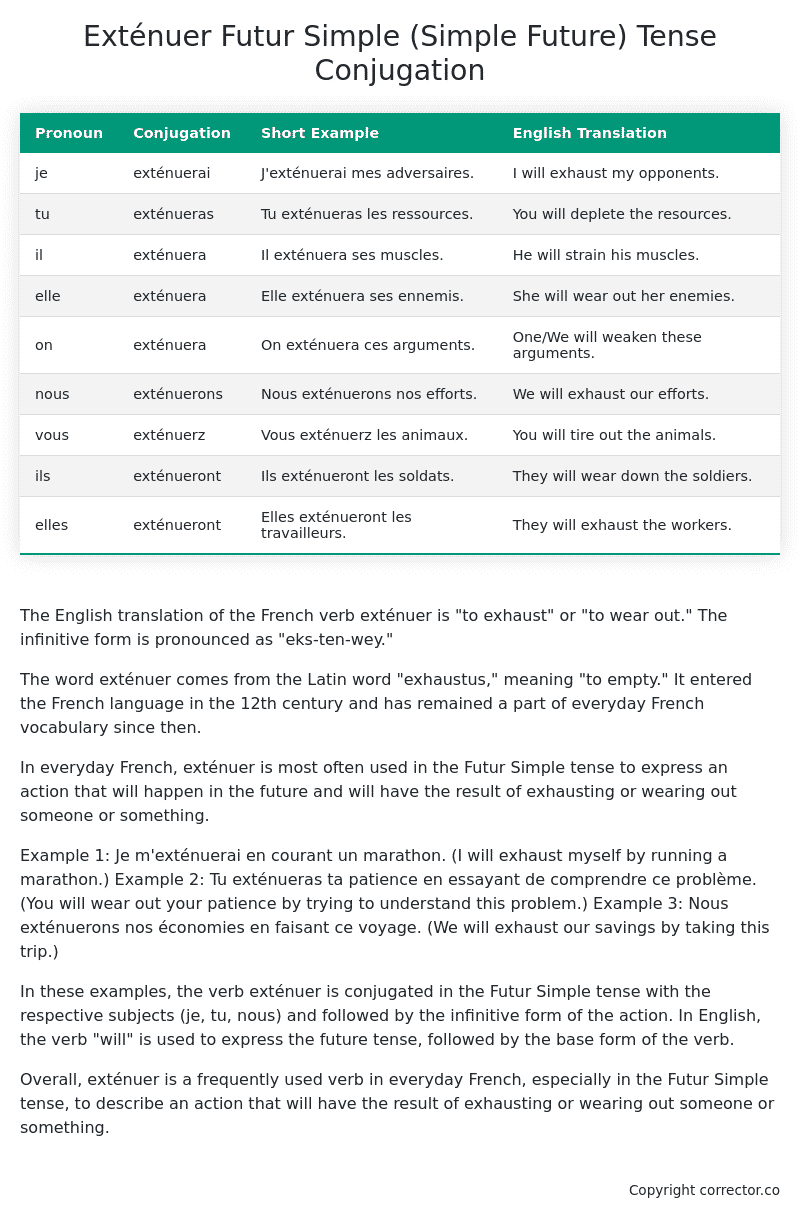Futur Simple (Simple Future) Tense Conjugation of the French Verb exténuer
Introduction to the verb exténuer
The English translation of the French verb exténuer is “to exhaust” or “to wear out.” The infinitive form is pronounced as “eks-ten-wey.”
The word exténuer comes from the Latin word “exhaustus,” meaning “to empty.” It entered the French language in the 12th century and has remained a part of everyday French vocabulary since then.
In everyday French, exténuer is most often used in the Futur Simple tense to express an action that will happen in the future and will have the result of exhausting or wearing out someone or something.
Example 1: Je m’exténuerai en courant un marathon. (I will exhaust myself by running a marathon.)
Example 2: Tu exténueras ta patience en essayant de comprendre ce problème. (You will wear out your patience by trying to understand this problem.)
Example 3: Nous exténuerons nos économies en faisant ce voyage. (We will exhaust our savings by taking this trip.)
In these examples, the verb exténuer is conjugated in the Futur Simple tense with the respective subjects (je, tu, nous) and followed by the infinitive form of the action. In English, the verb “will” is used to express the future tense, followed by the base form of the verb.
Overall, exténuer is a frequently used verb in everyday French, especially in the Futur Simple tense, to describe an action that will have the result of exhausting or wearing out someone or something.
Table of the Futur Simple (Simple Future) Tense Conjugation of exténuer
| Pronoun | Conjugation | Short Example | English Translation |
|---|---|---|---|
| je | exténuerai | J’exténuerai mes adversaires. | I will exhaust my opponents. |
| tu | exténueras | Tu exténueras les ressources. | You will deplete the resources. |
| il | exténuera | Il exténuera ses muscles. | He will strain his muscles. |
| elle | exténuera | Elle exténuera ses ennemis. | She will wear out her enemies. |
| on | exténuera | On exténuera ces arguments. | One/We will weaken these arguments. |
| nous | exténuerons | Nous exténuerons nos efforts. | We will exhaust our efforts. |
| vous | exténuerz | Vous exténuerz les animaux. | You will tire out the animals. |
| ils | exténueront | Ils exténueront les soldats. | They will wear down the soldiers. |
| elles | exténueront | Elles exténueront les travailleurs. | They will exhaust the workers. |
Other Conjugations for Exténuer.
Le Present (Present Tense) Conjugation of the French Verb exténuer
Imparfait (Imperfect) Tense Conjugation of the French Verb exténuer
Passé Simple (Simple Past) Tense Conjugation of the French Verb exténuer
Passé Composé (Present Perfect) Tense Conjugation of the French Verb exténuer
Futur Simple (Simple Future) Tense Conjugation of the French Verb exténuer (this article)
Futur Proche (Near Future) Tense Conjugation of the French Verb exténuer
Plus-que-parfait (Pluperfect) Tense Conjugation of the French Verb exténuer
Passé Antérieur (Past Anterior) Tense Conjugation of the French Verb exténuer
Futur Antérieur (Future Anterior) Tense Conjugation of the French Verb exténuer
Subjonctif Présent (Subjunctive Present) Tense Conjugation of the French Verb exténuer
Subjonctif Passé (Subjunctive Past) Tense Conjugation of the French Verb exténuer
Subjonctif Imparfait (Subjunctive Imperfect) Tense Conjugation of the French Verb exténuer
Subjonctif Plus-que-parfait (Subjunctive Pluperfect) Tense Conjugation of the French Verb exténuer
Conditionnel Présent (Conditional Present) Tense Conjugation of the French Verb exténuer
Conditionnel Passé (Conditional Past) Tense Conjugation of the French Verb exténuer
L’impératif Présent (Imperative Present) Tense Conjugation of the French Verb exténuer
L’infinitif Présent (Infinitive Present) Tense Conjugation of the French Verb exténuer
Struggling with French verbs or the language in general? Why not use our free French Grammar Checker – no registration required!
Get a FREE Download Study Sheet of this Conjugation 🔥
Simply right click the image below, click “save image” and get your free reference for the exténuer Futur Simple tense conjugation!

Exténuer – About the French Futur Simple (Simple Future) Tense
Formation of Futur Simple
For regular -er verbs (e.g., parler – to speak)
For regular -ir verbs (e.g., finir – to finish)
For regular -re verbs (e.g., vendre – to sell)
Common Everyday Usage Patterns
Conditional Statements
Interactions with Other Tenses
Futur Antérieur
Conditional
Present
Summary
I hope you enjoyed this article on the verb exténuer. Still in a learning mood? Check out another TOTALLY random French verb conjugation!


